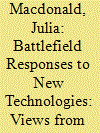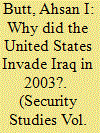|
|
|
Sort Order |
|
|
|
Items / Page
|
|
|
|
|
|
|
| Srl | Item |
| 1 |
ID:
167081


|
|
|
|
|
| Summary/Abstract |
How do individuals on the battlefield respond to the introduction of new technologies? How will unmanned and increasingly autonomous technologies be received by ground combat personnel? In this paper we explore tactical-level perceptions of one particular technology—armed unmanned aerial vehicles (UAVs)—by conducting a survey experiment of ground fires controllers. Our findings reveal that these personnel have strong behavioral reactions to the introduction of unmanned technology. Especially in situations with high risk to ground troops, we find a strong preference for manned aircraft with implications for the future use of UAVs and human–machine relationships in war. These results suggest the need to incorporate behavioral variables into future studies of military adoption and innovation and indicate that the future adoption of unmanned systems may be just as much about the “warm fuzzy” of trust as confidence in unmanned capabilities.
|
|
|
|
|
|
|
|
|
|
|
|
|
|
|
|
| 2 |
ID:
167083


|
|
|
|
|
| Summary/Abstract |
More than a century after citizen armies became an international norm, nearly two dozen states actively recruit foreigners into their militaries. Why do these states skirt the strong citizen-soldier norm and continue to welcome foreigners? To explain this practice, we first identify two puzzles associated with foreign recruitment. The first is practical: foreign recruits pose loyalty, logistical, and organizational challenges that domestic soldiers do not. The second is normative: noncitizen soldiers lie in a normative gray zone, permitted under the letter of international law but in tension with the spirit of international norms against mercenary armies. Next, we survey foreign military recruitment programs around the world and sort them into three broad types of programs, each with its own primary motivation: importing expertise, importing labor, and bolstering international bonds. We explain these categories and explore three exemplary cases in depth: Australia, Bahrain, and Israel. Our findings suggest that foreign recruitment can affect a state’s military operations by allowing militaries to rapidly develop advanced capabilities, by reducing the political risk associated with the use of force, and by expanding a state’s influence among former colonial and diaspora populations.
|
|
|
|
|
|
|
|
|
|
|
|
|
|
|
|
| 3 |
ID:
167084


|
|
|
|
|
| Summary/Abstract |
When intelligence agencies assess whether a state is pursuing nuclear weapons, how much evidence is enough? I argue that intelligence agencies adopt different standards for rendering definitive judgments in such situations. This, in turn, pushes them toward different kinds of mistakes. Urgent judges reach definitive conclusions about the existence of secret nuclear weapons programs more quickly and with less evidence than their peers. They risk seeing ambitious nuclear schemes where none exist. Skeptical judges wait longer and accumulate more proof before reaching definitive conclusions. They risk erring in the direction of underestimation. Where existing work focuses on intelligence accuracy, I show that variation in judgment is a distinct and important dimension of performance. What, then, drives judgment? I test an explanation based on the dynamic influence of previous intelligence failure. I observe that the judgment of intelligence agencies in two states, the United States and Israel, was differentially affected by failure as they tracked potential nuclear proliferation by Libya and Syria. These controlled comparisons constitute a novel approach to the study of nuclear intelligence performance. I find significant support for my explanation. Fearing repeat failure, intelligence agencies alter their efforts and standards of proof in an area critical to statecraft.
|
|
|
|
|
|
|
|
|
|
|
|
|
|
|
|
| 4 |
ID:
167085


|
|
|
|
|
| Summary/Abstract |
As was evident from the intense reaction to Donald Trump’s comments during the 2016 presidential campaign about nuclear proliferation, many analysts believe that the United States has consistently given the goal of nonproliferation a top priority since the beginning of the nuclear age. That conviction, in turn, plays a major role in policy debates among experts in this area. In this article, I show that nonproliferation does not necessarily take precedence over other important US geopolitical interests through a close examination of American policy toward the Israeli nuclear program during the 1960s. Although nonproliferation goals certainly came into play, US officials repeatedly gave priority to other key objectives and, to a real extent, even believed that Israel’s nuclearization could hold certain strategic advantages. This finding, of course, has important theoretical implications for the basic question of whether international politics still works essentially as it did in the pre-nuclear era, as well as for policy debates over nuclear proliferation.
|
|
|
|
|
|
|
|
|
|
|
|
|
|
|
|
| 5 |
ID:
167079


|
|
|
|
|
| Summary/Abstract |
US public anger and desire to avenge the September 11, 2001 terror attacks were redirected toward Iraq partly because of its identity as an Arab and Muslim state. Online panel survey data reveal that citizens who were relatively angry about the terror attacks were more belligerent toward Iraq, an effect that was strongest among those who perceived Arabs and Muslims in monolithic terms. The angry desire to avenge 9/11 was more persistent for those who saw Arabs and Muslims in that light, and its effect on war support was partially mediated by worsened feelings about Arabs and Muslims in general. These findings help explain why public belligerence toward Iraq shot up right after 9/11, before President George W. Bush began alleging that Iraq was pursuing weapons of mass destruction and had ties to al Qaeda.
|
|
|
|
|
|
|
|
|
|
|
|
|
|
|
|
| 6 |
ID:
167082


|
|
|
|
|
| Summary/Abstract |
Why did the United States invade Iraq in 2003? Most scholars cite the nonproliferation of weapons of mass destruction (WMD), a neoconservative desire to spread democracy, or the placating of domestic interest groups as the Bush administration’s objectives, but I suggest these arguments are flawed. Instead, I proffer the “performative war” thesis resting on the concepts of status, reputation, and hierarchy to explain the Iraq war. Hegemons desire generalized deterrence, such that others do not challenge their territory, preferences, or rule. However, the challenging of a hegemon’s authority—as occurred on 9/11—generates a need to assert hegemony and demonstrate strength to a global audience. Only fighting a war can demonstrate such strength; no peaceful bargain, even a lopsided one, can achieve the same effect. Consistent with this framework, the United States fought Iraq mainly for its demonstration effect—defeating the recalcitrant Saddam would lead other states to fear the United States and submit to its authority and global order.
|
|
|
|
|
|
|
|
|
|
|
|
|
|
|
|
|
|
|
|
|